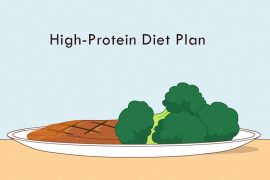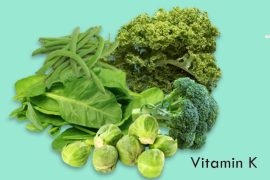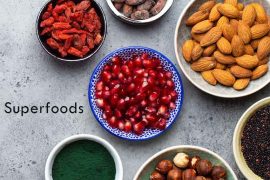In the present course of a busy lifestyle, taking care of our immunity is the primary objective one should have. A balanced and well-set immunity for a human body can be only achieved while maintaining a proper diet with all the credentials of vitamins, minerals, regular exercise, and taking in vital nutrients. While being a busy bee can make it difficult to integrate some of these positive habits into our lives, thus possibly putting our immune system and health at risk.
To put all the risks away, it is highly recommended to understand the importance of our immune system at the early stage, so that it does not cost our life in the long run. An incorrect perception of many food items that we consider healthy is actually not the same as we assume. For example, daily products that we think healthy have high amounts of gluten compounds. Foods having natural essence are the best source of food need to be consumed to remain fit and healthy. Ready to eat processed foods can never replace the natural benefits obtained from organic fruit and vegetables.
During an unhealthy turmoil in the human body, especially in the case of allergies, our immune system responds by attacking itself, while the symptoms remain unseen until the condition gets worsened. However, considering the vulnerability of your immune system, it is highly advised to take the right precautions at the right time to prevent such illness.
It is necessary that we should question ourselves, regards to the awareness towards our body, and also our overall diet, sleep, and exercise routine. As we know that every action has its equal and opposite reaction and this is what matters while considering an improper daily routine, which may be the cause of various health-related issues. Eating healthy is a good sign but it also results in increasing the chances of free radicals. These free radicals are produced daily in our body and can be very harmful, even to extent of causing cancer. We do have a backup system in our body, known as antioxidants, which are crucial in eliminating free radicals from our body by donating an electron. But this antioxidant does suffer from every dose of unhealthy consumption that we do. Like a superhero, we do have superfoods like chia seeds, vitamins, minerals like zinc, and herbs like turmeric, which are used for proper antioxidant absorption in our body. Curcumin is also one of them, which has been derived from turmeric, as it proves to be a shield for us, for better absorption of antioxidants and other minerals and vitamins.
FREE RADICALS
Free radicals are oxygen-containing molecules that are essential for the body. It is observed that these free radicals multiply in excess if the body is lacking enough antioxidants, in such a case extra free radicals break down into cells and cause oxidative stress to the body. Oxidative stress causes damage to the cell’s structure, proteins, and lipids.
Besides oxygen-containing molecules, free radicals have an uneven number of electrons, which tends to react with other molecules. During the normal metabolic process, our body produces free radicals, an imbalance of free radicals inside the mitochondria, the cells are depleted of necessary resources. The same way a gas generator leaves environmentally harmful exhaust gases, free radicals can cause harm to the body’s cells.
CONDITIONS CAUSED BY EXCESS OF FREE RADICALS
- Cardiovascular diseases and macular degeneration.
- Ageing – wrinkles, hair loss, grey hair, loss of skin elasticity, hardened arteries.
- Autoimmune disorders like cancer, rheumatoid arthritis.
- Dementia and Alzheimer’s.
- Vision problems like cataract.
- Diabetes and ulcers.
- Rheumatoid arthritis, Parkinson’s disease, and emphysema.
- Inflammation-induced diseases.
REASONS FOR PRODUCTION OF EXCESS FREE RADICALS IN THE BODY:
- Toxicity, injury, trauma, or excessive exercise.
- Taking foods containing refined carbohydrates and sugars and consuming excessive red meat.
- Fried or processed foods – sausages, salami, bacon, etc.
- Smoking and alcohol.
- Including too much or little amounts of metals in diet (zinc, iron, and others).
- Reusing cooking oils.
- Air pollution.
ILLNESSES CAUSED BY OXIDATIVE STRESS DUE TO EXCESS FREE RADICALS
- Noise sensitivity, vision problems.
- Fatigue, muscle, and joint pain.
- Headache, brain fog, stroke, and other memory problems.
- Cancer and emphysema.
- Parkinson’s disease, arthritis, heart disease and respiratory diseases.
- Immune deficiency.
- Wrinkles, grey hair.
Excess of free radicals and a lack of antioxidants to neutralize them is one cause for why you might face any of the illnesses mentioned above.
ANTIOXIDANTS
 Antioxidants are substances in the human body that removes free radicals by donating an electron and hence helps to reduce oxidative stress and protect the body from illnesses. To increase antioxidants in the body, a person’s diet is as important as anything else. Consumption of fruits and vegetables provides many useful antioxidants in the form of vitamins and minerals that the body cannot create on its own.
Antioxidants are substances in the human body that removes free radicals by donating an electron and hence helps to reduce oxidative stress and protect the body from illnesses. To increase antioxidants in the body, a person’s diet is as important as anything else. Consumption of fruits and vegetables provides many useful antioxidants in the form of vitamins and minerals that the body cannot create on its own.
SOURCES OF ANTIOXIDANTS:
Since antioxidants are extremely important molecules to neutralize the free radicals, the following are the possible
sources for antioxidants:
- Self-production by the human body – Antioxidants can be produced by the body itself in response to bodily inflammation, radiation, drugs, pesticides, mitochondria, etc. We call these “endogenous antioxidants”.
- Regular Exercise – Exercise also helps in creating stronger antioxidant defences.
- Proper Diet – Dietary sources of antioxidants include cranberries, corn, mangoes, papaya, tomatoes, broccoli, carrots, apples, blueberries, spinach, green tea, mustard, turmeric, alfalfa sprouts, nuts, plums and many other fruits and vegetables provides many useful antioxidants.
- Balanced connection of Vitamins and Minerals: – Allowing a balanced level of vitamins, minerals and other nutrients in the body provides good sources of antioxidants.
You can increase antioxidants in the body through the supplements of Vitamin A, selenium, manganese, lycopene, Vitamin C, Vitamin E, lycopene, lutein, beta-carotene, and lutein. The antioxidants that come from the diet and other external sources are called “exogenous antioxidants”. This is where our external supplements and nutraceutical comes to the rescue.
Our Immune System
 Our immune system can be readily termed as a defence system of a human body, which acts as a protective gear to fight all infectious odds, that silently hit our body and makes us ill. An immune system defends your body against infections by fighting disease-causing microorganisms and germs. To boost up an immune system, a healthy lifestyle is required to have unending shielding capabilities. The human body’s immune system is an amalgamation of cells, tissues, proteins, and organs; therefore, you should aim at working to improve the functions of every part of your immune system.
Our immune system can be readily termed as a defence system of a human body, which acts as a protective gear to fight all infectious odds, that silently hit our body and makes us ill. An immune system defends your body against infections by fighting disease-causing microorganisms and germs. To boost up an immune system, a healthy lifestyle is required to have unending shielding capabilities. The human body’s immune system is an amalgamation of cells, tissues, proteins, and organs; therefore, you should aim at working to improve the functions of every part of your immune system.
IMMUNE SYSTEM IS MADE UP OF
- White blood cells/leukocytes – White blood cells or leukocytes are made in the bone marrow and thymus and are responsible to carry blood throughout the body while fighting against disease-causing micro-organisms. There are a variety of white blood cells, each type is programmed to defend the body differently.
- Spleen – It is an organ situated above the stomach and under ribs on the left side and plays multiple supporting roles in the body. As a part of the immune system, the spleen act as a filter for blood. Used to store and manage white blood cells, the spleen helps us to fight against many kinds of bacteria that cause pneumonia.
- Tissues – All tissues including muscles, nerves, and connective tissues.
- Entire Abdomen – Whole abdomen of the human body consisting of the stomach and bowel system.
- Tonsils – They are located behind your throat and protect you from lung, gastrointestinal and throat infections.
- Antibodies – Recognizes antigens and helps the body in fighting recognized foreign invaders. Antibodies are either developed by your body itself or are acquired.
- Proteins – Regulate the body’s tissues and organs. It is seen that proteins are at times at risk of auto-immune diseases especially due to hereditary causes.
- Organs (bone marrow, thymus, and others) – The bone marrow and the thymus manage white blood cells, which are important for proper immune system functioning. They can slow down the process of creating white blood cells in some cases, especially in old age. The immune system requires resources (vitamins and minerals) to function and produce cells. The bone marrow is considered the main generator of immune cells. On the other hand, zinc, an important immunity metal ensures proper sizing and function of the thymus gland.
- Lymph nodes – The lymphatic system contains lymph nodes that destroy germs and other invaders and also prevent any sickness. These lymph nodes are present throughout the body system and tend to swell or become tender when they are fighting an infection.
 A GOOD IMMUNE SYSTEM PROTECTS THE BODY FROM HAVING
A GOOD IMMUNE SYSTEM PROTECTS THE BODY FROM HAVING
- Flu, cold, fever, sore throat chest discomfort and cough.
- Body aches, inflammations, and numbness.
- Fatigue/exhaustion, headaches, and concentration problems.
- Redness.
- Hair loss.
- Other infections.
If you notice any of the symptoms mentioned above, then it means that your immune system has been activated to fight against some bacteria or some other disease-causing microorganism. If the symptoms continue for long, it shows that your immune system is weaker in these aspects and you must visit a doctor.
However, it has been seen that when free radicals/pathogens attack the cells or an organ, they become inflamed, this is a good sign as it is in response to some damage. However, when it is uncontrolled, the inflammation may create more damage itself.
Two types of inflammation occur in the human body
Acute inflammation – It is a short-term process that occurs in response to a tissue injury, showing five cardinal signs i.e. pain, redness, mobility restrictions, swelling, and heat. Sometimes infection occurs and our immune system responds to it might exhibit a few of the symptoms mentioned above. An increase in blood flow and vascular permeability are a few reactions that occur in the body which do not last too long, though the symptoms are noticeable.
Chronic inflammation – Chronic inflammation generally takes time to show symptoms because they are always in the frequent attack of infections which lead to tissue damage. Sometimes acute inflammation can turn into chronic inflammation if infections are not resolved or treated.
Inflammation can be reduced by taking Curcumin (from turmeric), pomegranate, extra virgin olive oil, garlic, omega 3 fatty acids, ginger, soy, trans fatty acids, flavonoids, red meat, etc.
TYPES OF IMMUNITY: 1.)
Active immunity
Due to disease – Disease-specific proteins are produced by the body itself and are used to destroy the disease-carrying microorganisms. When our body gets exposed to any disease such as chickenpox, then our immunity system produces antibodies and locks them into specific antigens. In such a case, these antigens avoid any further sickness with the same disease and also prepares our body to fight easily for future attacks. We come across numerous germs daily, but we do not get sick frequently due to the antibodies produced in this process.
Due to vaccination (also called immunization) – Through vaccination, the body is introduced to a germ, pathogen or other disease-causing microorganisms, which helps to train the immune system to fight against all odds and avoids a future attack by that microorganism. There are myths regarding the vaccination process stating that it has side effects, which might be true in general but can apply to all other remedies and medicines we take. However, for vaccination to work properly, your body should have optimal immunity.
2.) Passive immunity
Antibodies from another person – This is a temporary form of immunity gained from another person. The process involves the transfer of antibodies from a healthy (recovered) person to another person. Mothers also transfer antibodies to the child during birth so that child can survive primal infections.
Antibodies made in the lab – These antibodies are used to treat people at risks of infections and are prepared either at labs or taken from animals.
Why is it important to maintain a healthy immune system? If your body’s immune system is strong, it can:
- Fight germs, bacteria, viruses, and other disease-carrying microorganisms.
- Heal wounds faster.
- Neutralize the body’s inflammation.
- Recognize disease-causing microorganisms faster from the environment.
- Fight cancer cells.
- It is better to prevent than to cure these conditions to have a strong immune system.
What affects your immune system?
Many factors affect the immune system’s response in our body and how efficiently it can fight illnesses.
- Diet – What we consume is what we get in return and thus here is where diet sums up a major role to have a good immune system. You should aim to reach your body’s needs by intaking ample quantities of vitamins and minerals through food. You should include fruits, vegetables, and a good amount of water. Avoid drinking alcohol, as it is injurious from all parameters. Ensure that you do not lack certain vitamins and minerals as this will impact your immune system’s behaviour. Consume the right amount of water every day as it is important for the proper functioning of the whole bodily system.
Ingredients to be Included in your Diet
Vitamin A/Beta carotene – The body converts beta-carotene into Vitamin A which acts as an antioxidant. It reduces inflammation, protects against cancers (like lung cancer), measles, acute pneumonia, mumps, and other chronic illnesses. It is found in red bell peppers, sweet potatoes, carrots, spinach, lettuce, grapefruit, fish oil, butter, and dried apricots.
Vitamin C – The body cannot produce or store the antioxidant Vitamin C, so it needs to be taken from other sources. It helps in curing colds, builds collagen, maintains healthy skin, aids white blood cells to fight infections, reduces stomach and lung cancer, and supports the cardiovascular system. It is found in Citrus fruits, bell peppers, broccoli, spinach, tomatoes, strawberries, peppers, papaya, kiwis, and lemons. High doses can cause abdominal pain, diarrhoea, or nausea.
Vitamin E – It is a fat-soluble antioxidant supports muscles, skin, hair and red blood cells; helps to prevent colds, respiratory infections, cataract, cancer, arthritis, ischemia and asthma. It is found in broccoli, soybean, sunflower seeds, corn, walnuts, red peppers, oranges, lemons, avocados, dark leafy greens, poultry, meat, and wheat germ oil.
Selenium – This trace mineral helps with curing viral infections such as swine flu, lowers the risk of cancer, regulates the cardiovascular system, thyroid system, muscle function and endocrine system. It is found in sunflower seeds, seafood, grains, dairy products, meat, and nuts. Vitamin B6 – This water-soluble vitamin helps patients with carpal tunnel syndrome, irritability, confusion, cardiovascular disease, premenstrual syndrome, depression, tongue inflammation, and ulcers. It is found in sunflower seeds, chicken, fishes, poultry, potatoes, dried plums, avocado, bananas, chickpeas, legumes and green vegetables.
Potassium – It helps in cases of water retention, kidney stones, reducing blood pressure, manages nervous system regulation protects against stroke and osteoporosis. It is found in papaya, kiwi, avocado, bananas, kale, white potatoes, pinto beans, salmon, etc.
Zinc – It is a mineral that boosts white blood cells, ensures the functioning of the thymus gland, helps in healing wounds, helps battle colds, diaper rash, skin irritations, ADHD, herpes, and HIV. It is found in nuts, pumpkin seeds, baked beans, yoghurt, oatmeal, cheese, peas, oysters, sesame seeds, beans, some forms of Shellfish, and lentils. Avoid a high intake of zinc as it otherwise harms the immune system.
Iron – It helps in dealing with shortness of breath, headache, hair loss, difficulty swallowing, pale complexion, heart palpitations, lethargy, anaemia, and increases red blood cells and oxygen in the body. It is found in nuts, legumes, meat, tofu, shellfish, seeds, dried fruits, poultry, brown rice, etc. Vitamin C is needed for the absorption of iron.
Vitamin D – It reduces the risk of viral, respiratory tract infections, prevents tuberculosis, cardiovascular disease, hepatitis. It is found in fortified cereals, yoghurt, mushrooms, fish, eggs, and some other plant-based resources.
Vitamin K – This fat-soluble vitamin is necessary for bone metabolism, regulating enzyme systems, blood coagulation, treating cancer, inflammatory diseases. Vitamin K is found in kiwis, fish, kale, spinach, prunes, cauliflower, cabbage, meat, cereals, and Brussels sprouts.
Folic acid/ Vitamin B-9 – It treats depression, uterine cervical dysplasia, malabsorption syndromes, cancer, sickle cell anaemia, dialysis, diarrhoea, and fatigue. It is found in sunflower seeds, seafood, peanuts, spinach, lettuce, broccoli, asparagus, fortified foods, and whole grains.
Fibre – Soluble fibre is used by the body to fight infections, cure obesity-related diseases and prevent strokes and heart attacks. Broccoli, avocados, figs, wheat bran, berries, flaxseed, trout, barley, salmon, tuna, oats, apples, carrots, nuts, sardines and oranges are a few sources of fibre.
Flavonoids – It is an antioxidant that helps to fight cancer, allergies, bacteria, memory problems, arthritis, cardiovascular diseases, ageing, and autoimmune diseases. It is found in green and black teas, onions, grapes, soybean, blueberries, red wine, cocoa, apples, kale, parsley, leeks, and broccoli.
Phosphorus – It is used to cure conditions related to the bone, blood vessels, kidneys, red itchy eyes, and muscles. It is found in Sunflower seeds, beans, beer, fish, milk, yoghurt, chocolate, beans, and blueberry muffins. You must include vitamin D in your diet to be able to absorb phosphorus properly.
Magnesium – It can help in supporting the bones, muscles, and brain; reduce symptoms of asthma, diabetes, inflammation, cardiovascular diseases, ageing, and stress. It is found in sunflower seeds, unrefined grains, dry roasted almonds, spinach, bran flakes, avocados, soy, leafy vegetables, beans, and papaya.
Probiotics – Gut bacteria affect the immune system’s response and probiotics help to fight inflammation, maintain gut lining reduces the risk of upper respiratory tract infections. Sources of probiotics are yoghurt, miso, natto, buttermilk, kefir, and kimchi.
Avoid including the following in your daily food habits: Processed foods – Items like bread, biscuits, soft drinks, sausage rolls, ice creams, fruit juices, and candy.
Sugar rich food items – Sugar rich foods increase the chances of cancer and type 2 diabetes. You should avoid apple pie, pasta sauce, ketchup, sugary soft drinks, cereal bars, fruit yoghurts, and pastries.
Salt – People with high salt diets catch infections from bacteria faster. The chances of high blood pressure increase as well. Avoid packaged soup, salad dressing, pizza, tortillas, pickles, sauces, and frozen meals as they contain a high amount of sodium.
Gluten products – Gluten products cause gastrointestinal symptoms; cereals, French fries, bread, pasta, salad dressings, cakes, soy sauce, and bulgur wheat are examples of gluten products.
A) Exercise – Exercising regularly will certainly allow your body addicted to lead an active lifestyle and also to shed calories. Regular exercise has shown improvements in the metabolic system, immune system regulation, maintaining glucose and lipid metabolism, slowed ageing, improved cardiovascular health, lowered blood pressure, and reduction of stress hormones. Exercise promotes oxygen and blood circulation that allows cells and other substances of the immune system to move through the body freely and do their job efficiently.
B) Sleep – Sleep is necessary to recharge your body, if it is insufficient or improper for some reasons, then the body will not function properly. Obesity, Alzheimer’s, and some heart diseases are associated with improper sleeping habits which suppress the immune system. Stress hormones increase with lack of sleep and as a result cause insomnia.
C) Environment – Environmental factors such as frequent exposure to viruses can trigger the response of the immune system. Pollution, dust, and contact with microbes play a major role in harming the immune system.
D) Stress – Stress has been common conduct where people are unnecessarily exposed to. With stress, people tend to change their eating and other routine habits. In such a case they probably follow a comparatively unhealthy routine which affects their digestion process. Stress can often lead to headaches, asthma, and irritable bowel syndrome. Various diseases such as coronary heart disease, lupus, fibromyalgia, arthritis, psoriasis, and high blood pressure are related to stress. Mindfulness exercises can help people with stress which includes yoga, meditation, walks, therapy, and counselling.
Disclaimer:
The information contained in this article is for educational and informational purposes only and is not intended as a health advice. We would ask you to consult a qualified professional or medical expert to gain additional knowledge before you choose to consume any product or perform any exercise.








